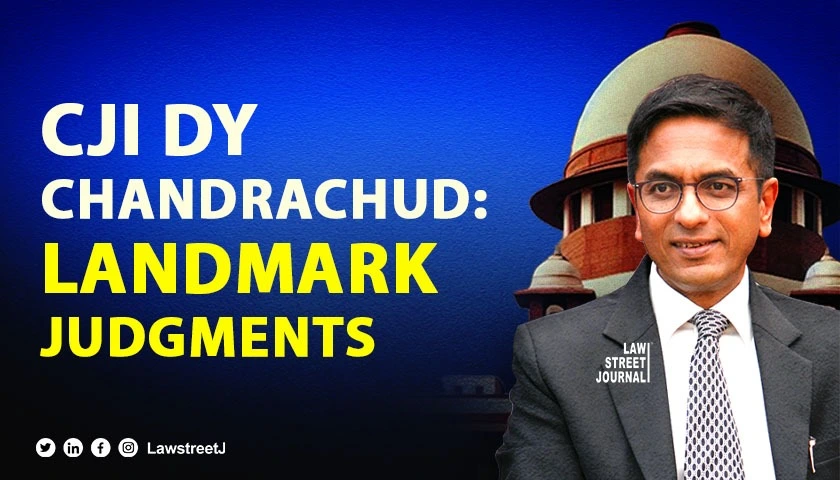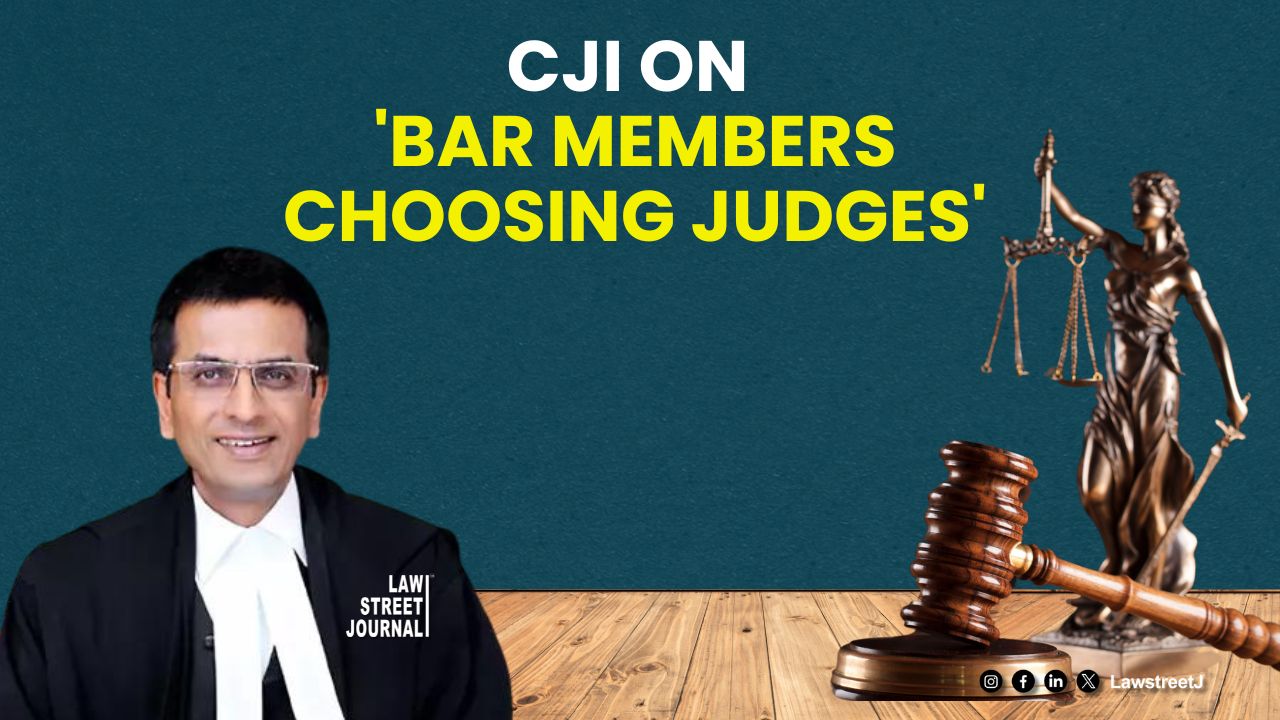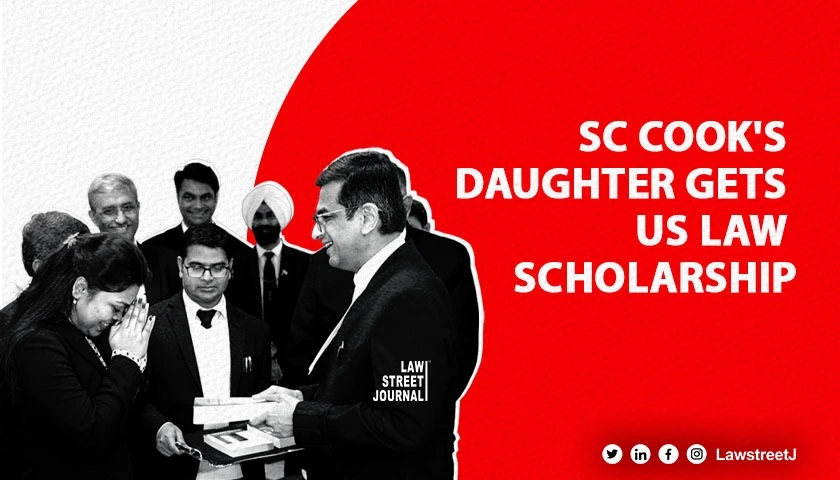New Delhi: Born on November 11th, 1959, into a family deeply entrenched in India's judicial history, D.Y. Chandrachud carries forward the esteemed legacy of his father, Y.V. Chandrachud, who served as the 16th Chief Justice of India.
His academic pursuits commenced at St. Stephens College in Delhi, where he earned his degree in economics and mathematics in 1979. Subsequently, he pursued legal studies at Delhi University's Faculty of Law, obtaining his Bachelor's degree in 1982. His exceptional scholastic achievements secured him the prestigious Inlaks scholarship, facilitating his advanced studies at Harvard University. There, he completed his LL.M. in 1983, distinguishing himself by securing the Joseph H. Beale prize for outstanding performance in the Conflict of Laws course. His academic pursuit culminated in a Doctorate in Juridical Sciences from Harvard, which he completed in 1986.
Upon returning to India, Justice Chandrachud enrolled as an advocate with the Bar Council of Maharashtra, initiating a career marked by an unwavering commitment to social justice. His early advocacy work exemplified this dedication, particularly evidenced in 1997, when he represented a laborer facing employment discrimination post HIV-AIDS diagnosis. His successful argumentation before the Bombay High Court established the precedent that HIV-AIDS status alone cannot constitute grounds for violating an individual's Right to Livelihood when they remain medically fit to discharge their duties. His practice encompassed significant cases concerning the rights of bonded women laborers and religious and linguistic minorities.
While establishing his eminence as a practicing advocate, Justice Chandrachud maintained substantial academic engagement, serving as a Visiting Professor of Comparative Constitutional Law at the University of Bombay from 1988 to 1997. The year 1998 marked significant professional milestones, as he was designated as a Senior Advocate at the notably young age of 38, a distinction rarely accorded to advocates under 40. That same year, he was appointed as Additional Solicitor General of India, a position he held until his elevation to the judiciary.
His judicial career progressed through several prestigious appointments: he served as a Permanent Judge of the Bombay High Court from March 29th, 2000, to October 30th, 2013; as Chief Justice of the Allahabad High Court from October 31st, 2013, to May 12th, 2016; and as a Judge of the Supreme Court of India from May 13th, 2016, to November 7th, 2022.
In November 2022, Justice D.Y. Chandrachud assumed the office of Chief Justice of India, succeeding Chief Justice Uday Umesh Lalit. As his tenure approaches its conclusion on November 10, 2024, he recommended Justice Sanjiv Khanna as his successor on October 17, 2024. Subsequently, President Droupadi Murmu, exercising powers under Article 124(2) of the Constitution, appointed Justice Sanjiv Khanna as the 51st Chief Justice of India. The Ministry of Law and Justice formally notified this appointment on October 24, 2024, confirming that Justice Khanna shall assume office on November 11, 2024, following Chief Justice Chandrachud's retirement.
Justice D.Y. Chandrachud’s tenure has been marked by a deep commitment to the principles of justice and constitutional rights. As he prepares to conclude his remarkable journey on the bench, it is essential to reflect on the notable judgments that exemplify his contributions to Indian jurisprudence. Throughout his illustrious career, Justice Chandrachud has rendered several landmark judgments that reflect his commitment to upholding constitutional values and addressing pressing social issues.
NOTABLE JUDGEMENTS
• Abhiram Singh v C.D. Commachen (2017) A seven-judge Constitution Bench examined the scope of seeking votes on religious grounds. The majority held that electoral candidates cannot seek votes on religious grounds. In his dissenting opinion, Justice Chandrachud made a crucial distinction between blanket communal appeals and grievance-based communal appeals, holding that only blanket communal appeals would violate the Representation of People Act, 1951. This distinction aimed to protect the legitimate articulation of social grievances while preventing purely communal propaganda.
• Justice K.S. Puttaswamy v Union of India (Privacy Case, 2017) In this landmark judgment, a nine-judge bench unanimously affirmed privacy as a fundamental right. Justice Chandrachud authored the majority opinion, speaking for himself and three other judges, establishing privacy as an intrinsic part of the right to life and personal liberty under Article 21. The judgment recognized various facets of privacy including bodily privacy, informational privacy, and privacy of choice. This verdict became the foundation for several subsequent judgments on personal liberty and dignity.
• Shafin Jahan v Ashokan K.M. (2018) Known as the Hadiya case, this judgment strongly upheld individual autonomy in matters of personal choice. The court held that an adult's right to choose their religion and marriage partner falls within their zone of privacy. Justice Chandrachud's concurring opinion emphasized that personal choices are protected under Article 21, and neither the state nor parents can interfere with an adult's right to make fundamental life decisions. The judgment set a significant precedent for personal autonomy cases.
• Government of NCT of Delhi v Union of India (2018) The judgment clarified the power dynamics in Delhi's governance structure. The court held that the Lieutenant Governor is bound by the Chief Minister's advice and cannot act independently. The verdict emphasized that representative democracy is an essential feature of governance, and the Chief Minister and Council of Ministers must lead the executive. This judgment significantly impacted the federal structure and governance of Delhi.
• Romila Thapar v Union of India (2018) This case concerned the arrest of five human rights activists for alleged involvement in the Bhima Koregaon violence. Justice Chandrachud's dissenting opinion focused on protecting fundamental rights, particularly Articles 19 (free speech) and 21 (personal liberty). He emphasized the need for a Special Investigation Team to ensure an impartial probe, highlighting the importance of safeguarding civil liberties while investigating serious offenses.
• Navtej Johar v Union of India (2018) In this historic judgment decriminalizing homosexuality, Justice Chandrachud's concurring opinion declared Section 377 unconstitutional. He characterized it as an anachronistic colonial law that violated fundamental rights to equality, expression, dignity, and privacy. The judgment emphasized that constitutional morality must prevail over social morality, and recognized that decriminalization was just the first step toward full recognition of LGBTQ+ rights.
• Justice K.S. Puttaswamy v Union of India (Aadhaar Case, 2018) As the sole dissenter, Justice Chandrachud held that passing the Aadhaar Act as a Money Bill was a fraud on the Constitution. He extensively analyzed how the Act affected privacy rights, examined the proportionality of the Aadhaar framework, and highlighted concerns about surveillance and data protection. The judgment showcased detailed scrutiny of both procedural and substantive constitutional issues.
• Joseph Shine v Union of India (2018) The court decriminalized adultery by striking down Section 497 of IPC. Justice Chandrachud's concurring opinion found that the provision violated Articles 14, 15, and 21 of the Constitution. He particularly emphasized how the law was rooted in patriarchal notions of women as property, violated women's dignity, and perpetuated gender stereotypes. The judgment recognized marriage as an equal partnership based on dignity and autonomy.
• Indian Young Lawyers Association v State of Kerala (2019) In the Sabarimala Temple entry case, the court held that excluding women between ages 10-50 violated constitutional morality. Justice Chandrachud's opinion uniquely held that the practice also violated Article 17 (prohibition of untouchability) as it assigned a notion of impurity to women and that it was unconstitutional to exclude women based on biological reasons. Further the court also ruled, Rule 3(b) of the Public Worship Rules which allowed the custom of prohibition of women as unconstitutional.
• M Siddiq v Mahant Suresh Das (Ayodhya Title Dispute) (2019) As part of the unanimous five-judge bench decision, the court granted the disputed land to Shri Ram Virajman while ensuring justice for all parties. The judgment, running into thousands of pages, carefully examined historical evidence, legal principles, and constitutional values. It directed allocation of alternative land to the Sunni Waqf Board, attempting to balance competing claims through constitutional means.
• Government of NCT of Delhi vs. Union of India (2023) The Constitution bench upheld the Delhi Government's power to control civil services in the National Capital Territory. Running into 105 pages, the judgment established that Delhi's status is "sui generis," setting it apart from other Union Territories. The court held that NCTD's executive power is co-extensive with its legislative power, significantly impacting Delhi's governance structure.
• Subhash Desai vs. Principal Secretary, Maharashtra (2023) In this 141-page judgment addressing the Maharashtra political crisis, the court held that Uddhav Thackeray's government couldn't be restored as he resigned without facing a floor test. The court found the Governor justified in administering oath to Mr. Shinde with BJP support. Significantly, the judgment also declared the Speaker's decision to appoint Mr. Gogawale as party whip illegal and referred the Nabam Rebia judgment to a larger bench.
• Supriyo Chakraborty vs. Union of India (2023) This landmark 366-page judgment on same-sex marriage, delivered by a 3:2 majority, held that non-heterosexual couples cannot claim an unqualified right to marry. While leaving the decision to expand marriage laws to Parliament, the court issued comprehensive directions to protect the LGBTQ+ community from discrimination and violence. The judgment balanced constitutional rights with legislative prerogative.
• Cox and Kings Ltd. vs. SAP India (2023) The court established the applicability of the 'group of companies' doctrine in Indian arbitration proceedings. The 152-page judgment clarified that the doctrine requires examining factors like direct relationships with signatory parties, commonality of subject matter, and composite nature of transactions. The Supreme Court held that companies outside of an arbitration agreement can be made parties to arbitration proceedings as per the Group of Companies doctrine. This verdict significantly impacted commercial arbitration in India.
• AIn Re: Article 370 of the Constitution (2023) In this historic 476-page judgment, the Constitution bench upheld the Central Government's 2019 decision to abrogate Article 370. The court held that Jammu and Kashmir lost sovereignty after signing the Instrument of Accession, and Article 370 represented asymmetric federalism rather than sovereignty. The judgment extensively analyzed constitutional history and federal principles.
• Arbitration Agreements Case (2023) A seven-judge bench, with a 6:1 majority, held that unstamped arbitration agreements are enforceable, overruling the N.N. Global Mercantile case. This 155-page judgment significantly impacted commercial arbitration by removing technical barriers to arbitration proceedings, promoting alternative dispute resolution.
• Gaurav Kumar vs. Union of India (2024) The court ruled that Bar Councils cannot charge enrollment fees beyond statutory limits under Section 24(1)(f) of the Advocates Act and held that this provision is a fiscal regulatory measure requiring strict construction, emphasizing that Bar Councils, as delegates of Parliament, cannot modify fiscal policy. The court held that the enrolment fee cannot exceed Rs.750 for advocates belonging to the general category and Rs.125 for advocates belonging to SC/ST categories.
• Just Rights for Children Alliance Case (2024) The court overturned the Madras High Court's ruling that mere possession or storage of child pornographic materials was not an offense. Justice D.Y. Chandrachud described the High Court's judgment as "atrocious." This ruling clarified that possessing child pornographic material with specific intent constitutes an offense under the POCSO Act, even without actual transmission. With this decision, India joins a select group of countries that have explicitly criminalized the viewing of child pornography. Additionally, the court directed the Ministry of Women and Child Development to implement comprehensive sex education programs to raise awareness of the legal and ethical implications of child pornography. The judgment also urged Parliament to consider amending the POCSO Act to replace the term "child pornography" with "CSEAM" (Child Sexual Exploitation and Abuse Material) and instructed all courts to avoid using "child pornography" in judicial orders and judgments.
• M.K. Ranjitsinh and Others v. Union of India (2024) Addressing environmental concerns, the court recognized the right to protection from climate change's adverse effects as part of fundamental rights. The court in this case expanded the interpretation of the Right to Life (Article 21) and the Right to Equality (Article 14) to include protection against climate change and emphasized the duty of the state to protect the natural world and the fundamental duty of citizens to have compassion for living creatures.
• Association for Democratic Reforms v Union of India (Electoral Bonds Case) (2024) The five-judge bench declared the Electoral Bonds Scheme unconstitutional for violating the right to information under Article 19(1)(a). The Bench held that the Scheme violated the voters’ right to information enshrined in Article 19(1)(a) of the Constitution. The Court also directed that the sale of electoral bonds be stopped with immediate effect and SBI was directed to submit details of the Electoral Bonds purchased from 12 April 2019 to the ECI and it was directed to publish the information shared by SBI on its official website. This significant judgment impacted political funding transparency, requiring disclosure of all political donations made through electoral bonds.
• State of Punjab vs. Davinder Singh (sub-classification of SC/STs) (2024) A seven-judge bench, with a 6:1 majority, permitted sub-classification within SC/ST categories, overruling the EV Chinnaiah case. The judgment emphasized creamy layer considerations and affirmed the states' power to ensure equitable benefit distribution among different SC/ST sub-groups. CJI D.Y. Chandrachud, along with Justice Misra, cited historical evidence indicating that Scheduled Castes are not a homogeneous class. The court ruled that sub-classification does not violate Article 14 or Article 341(2) of the Constitution and that Articles 15 and 16 do not prevent the State from sub-classifying a caste.
• State of UP vs. M/s Lalta Prasad Vaish (State’s power to regulate industrial alcohol (2024) A nine-judge bench ruled by 8:1 majority that states have the power to regulate denatured spirit/industrial alcohol. The court broadly interpreted "intoxicating liquor" in Entry 8 of List II to include industrial alcohol, significantly impacting state regulatory powers.
• Sita Soren v Union of India (Legislative Immunity for Lawmakers Facing Bribery Charges) (2024) A seven-judge bench unanimously overruled the P.V Narasimha Rao case, holding that lawmakers don't enjoy parliamentary immunity for bribery under Articles 105(2) and 194(2). This judgment strengthened anti-corruption measures in legislative bodies.
Justice D.Y. Chandrachud’s tenure as the 50th Chief Justice of India has been marked by a profound commitment to upholding constitutional values and advancing social justice. His judgments reflect a nuanced understanding of the law, balancing individual rights with the broader societal implications of legal decisions. From establishing the right to privacy to decriminalizing homosexuality and addressing pressing environmental issues, his contributions have significantly shaped Indian jurisprudence.
Justice Chandrachud's ability to interpret the Constitution in a manner that resonates with contemporary societal challenges illustrates the judiciary's vital role in safeguarding democracy and individual liberties. His emphasis on the protection of marginalized communities and commitment to ensuring equitable justice for all stands as a testament to his dedication to constitutional principles.
As he prepares to conclude his remarkable journey on the bench, the legacy of Justice D.Y. Chandrachud will undoubtedly continue to influence future generations of legal practitioners and scholars. His landmark judgments not only serve as important precedents in Indian law but also reflect a broader vision of justice that aligns with the evolving values of society. The judiciary's role in nurturing democracy and upholding human rights remains more crucial than ever, and Justice Chandrachud's tenure exemplifies the profound impact a conscientious and principled judiciary can have on the nation. His legacy will inspire future leaders in the legal domain to advocate for justice, equity, and constitutional integrity in their pursuit of a just society.




!['Unprecedented,' 52,191 cases disposed of by Supreme Court in 2023 [Read Records]](/secure/uploads/2023/12/lj_4127_SC_disposes_of_cases.jpg)
!['Political background may not be sufficient to reject candidature of a HC judge,' Collegium rejects name of CPI(M) sympathiser [Read Recommendation]](/secure/uploads/2024/03/lj_5964_af308b13-978e-4939-9496-6e223b902b9f.webp)





